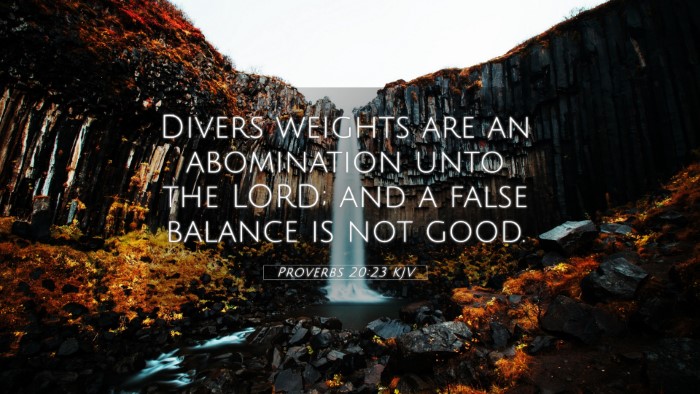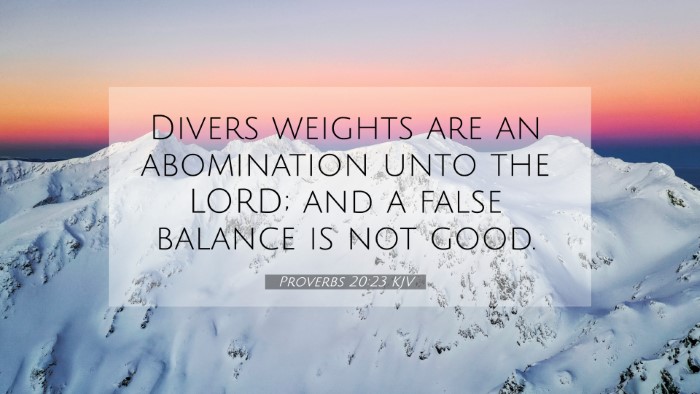Understanding Proverbs 20:23
Proverbs 20:23 states: "Diverse weights are an abomination unto the LORD; and a false balance is not good." This verse addresses the importance of honesty and integrity in trade and everyday dealings.
Meanings and Insights
This verse emphasizes the ethical framework governing personal and business interactions, a principle found throughout the Bible. Various commentaries provide valuable insights into this scripture.
-
Matthew Henry's Commentary:
Henry highlights the significance of honesty in measurements, symbolizing fairness in all forms of exchange. He notes that God abhors deceit and injustice, as they disrupt the moral order intended by divine law.
-
Albert Barnes' Notes:
Barnes points out that the “diverse weights” suggest manipulation for personal gain. He suggests that fairness in trade is not just a social convention but a divine expectation, linking this principle to God’s character.
-
Adam Clarke's Commentary:
Clarke expounds on the metaphor of “false balance,” interpreting it as not merely a physical scale but as applicable to all areas of life, including moral integrity and spiritual faithfulness.
Thematic Connections
The themes of honesty and fairness in Proverbs 20:23 resonate throughout scripture, linking to numerous other Bible verses:
- Proverbs 11:1: "A false balance is abomination to the LORD: but a just weight is his delight."
- Leviticus 19:35-36: "Ye shall do no unrighteousness in judgment, in meteyard, in weight, or in measure." This further establishes the standard for fairness set by God.
- Deuteronomy 25:13-16: This passage emphasizes the prohibition against differing weights, thereby reinforcing the moral implications of deceit in commerce.
- Zachariah 8:16: "These are the things that ye shall do; Speak ye every man the truth to his neighbor; execute the judgment of truth and peace in your gates."
- Luke 6:31: "And as ye would that men should do to you, do ye also to them likewise," promoting interpersonal honesty.
- James 5:12: "But above all things, my brethren, swear not, neither by heaven, neither by the earth, neither by any other oath: but let your yea be yea; and your nay, nay; lest ye fall into condemnation."
- Micah 6:11: "Shall I count them pure with the wicked balances, and with the bag of deceitful weights?" again echoing the condemnation of unjust practices.
Cross-Referencing Biblical Texts
The act of cross-referencing emphasizes the interconnectedness of scripture. Tools for Bible cross-referencing can enrich the understanding of Proverbs 20:23 by linking it to broader themes found in both the Old and New Testaments. Here are some methods:
-
Bible Concordance:
Utilize a Bible concordance to locate verses that discuss themes of justice and honesty, enhancing the comparative study of related scriptures.
-
Bible Cross-Reference Guide:
Employ cross-reference materials for deeper insights and to uncover the contexts that clarify the meaning of scriptures.
-
Cross-Referencing Bible Study:
Engage in studies that highlight thematic connections, allowing for a more comprehensive grasp of biblical principles regarding ethics and integrity.
The Importance of Fairness and Honesty
Understanding the implications of Proverbs 20:23 aids in the development of Christian ethics. Fair treatment in commerce and relationships is a reflection of the character of God and a foundation for community welfare.
Summary
In conclusion, Proverbs 20:23 serves as a poignant reminder of the call to integrity, urging believers to uphold just practices in every aspect of life. By engaging with the rich cross-references, readers can explore the deep biblical foundation for ethical interactions.







